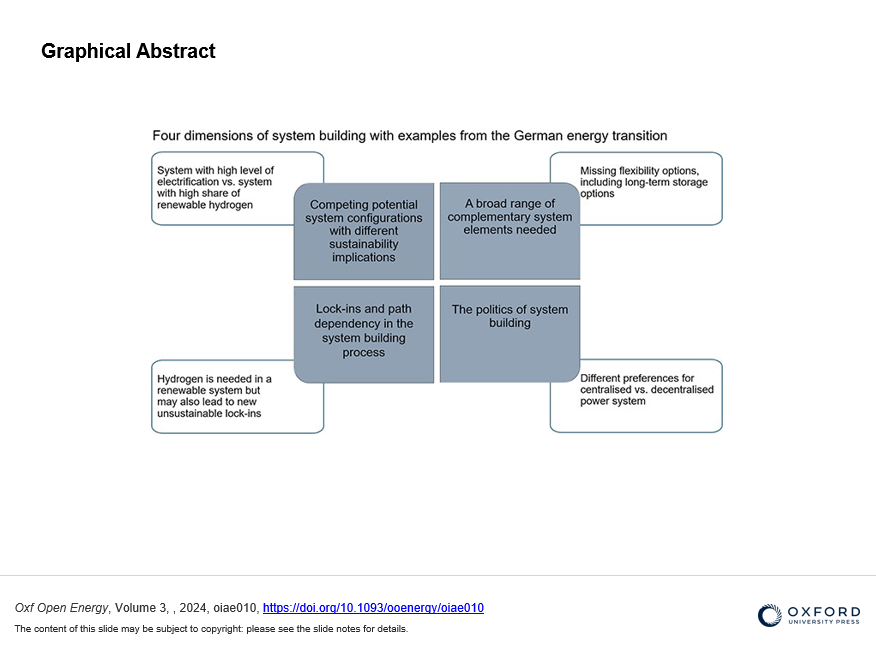News
New publication on system building
Check out the recently published paper here:
"The system building perspective for building sustainable system configurations using the German energy transition as an example", Sarah Olbrich & Dierk Bauknecht; Oxford Open Energy, Volume 3, September 2024.
Abstract:
An increasing number of countries employ net-zero decarbonization targets in their climate policies, which requires decarbonizing socio-technical systems like the energy system by mid-century. While there is a high level of agreement about net-zero targets, there remains great uncertainty as to how to meet them. At the same time, the challenges of building a new system that fulfils systemic targets such as net-zero are insufficiently reflected on in the sustainability transitions literature. With the help of a literature review building on theories of socio-technical transitions, this paper introduces system building dimensions that account for the difficulties of net-zero transitions. We identify four such dimensions: (1) competing potential system configurations with different sustainability implications; (2) a broad range of complementary system elements needed; (3) lock-ins and path dependencies in the system building process; and (4) the politics of system building. We offer the German energy transition as an empirical case study to illustrate the relevance of these system building dimensions.

Contribution to Deutschlandfunk programme on electricity
"Warum der Ausbau des Stromnetzes so schleppend vorankommt
Der steigende Strombedarf durch Elektroautos und Wärmepumpen sowie die schwankende Erzeugung aus erneuerbaren Energien fordern das deutsche Stromnetz heraus. Die Digitalisierung der Netze schreitet voran, aber der Umbau wird noch Milliarden kosten.“
To listen to the 20 minutes interview, follow this link:
https://www.deutschlandfunk.de/lange-leitung-warum-der-ausbau-des-stromnetzes-so-schleppend-vorankommt-dlf-9fa0e5f4-100.html
New reports published in collaboration with Constructor University
Check out the new reports here:
"TSO Coordination and Strategic Behaviour: A Game Theoretical and Simulation Model Study based on the German Electricity Grid" by Franziska Flachsbarth, Anna Pechan, Martin Palovic, Matthias Koch, Dierk Bauknecht, Gert Brunekreeft from Constructor University. Bremen Energy Working Papers No. 48, July 2024
Abstract:
The electricity grid includes multiple network areas managed by different operators, with transmission
system operators (TSOs) handling high-voltage areas and distribution system operators managing mid-
to low-voltage areas. These areas are interconnected and synchronized, creating classical external
effects where one operator's actions impact others. Recently, high voltage direct current (HVDC) lines
have been introduced, offering operators greater flexibility and control over power flows compared to
conventional alternating current (AC) lines, thereby reducing congestion and losses. However, HVDC
lines can significantly affect neighbouring grids, potentially leading to strategic behaviour by network
operators.
This paper examines the strategic use of HVDC lines, using a model-based approach on projected 2030
market data in the German electricity system. It finds that without explicit coordination mechanisms
most hours result in incentives for non-cooperative outcomes, with only three hours within one year
showing incentives for a cooperative outcome. Despite lower overall system costs with cooperation,
asymmetric distribution of cooperation benefits prevents long-term cooperation. Thus, cost-revenue-
sharing schemes are needed to promote cooperation and balance benefits.
-------
"Policy measures to apply the Whole System Approach (WSA) in energy infrastructures" by Gert Brunekreeft, Dierk Bauknecht, Martin Palovic, Anna Pechan, Franziska Flachsbarth, Matthias Koch from Constructor University. Bremen Energy Working Papers No. 47, June 2024
Abstract:
Following liberalization and especially the energy transition, energy infrastructures are developing rapidly and significantly. Electricity networks are expanded to facilitate connection of renewable energies and new load such as heat pumps and electric mobility. On the one hand, gas networks are preparing for a phase-out and, on the other hand, for a possible repurposing for transportation of hydrogen. At a communal level, the heat supply moves towards heat pumps and district heating, both in turn affecting electricity and gas infrastructure. Lastly, infrastructure for hydrogen and CO2 for CCS are being developed. These developments affect various stages within the energy sectors. These simultaneous and interactive developments require coordination between and within the different energy infrastructure. Improving the coordination of energy infrastructures has been coined Whole System Approach (WSA). In this report, we examine approaches and policy measures for applying the Whole System Approach.
Caterina participates to IST 24 Conference in Oslo
The Chair of Sustainability and Transformation Research contributed to the International Sustainability Transitions Conference with a speed talk held by Caterina Pacini "Steering acceleration in sustainability transitions: An overview of the strategies to address new emergent lock-ins".
This year's conference theme was "Sustainability transitions and nature". More information on our contribution can be found here: speed talk.
Dierk Bauknecht has joined the Advisory Board for a Study on Innovative Practices in Legislation around Emerging Tech
4FRONT together with European Future Innovation Systems (EFIS) Centre and Visionary Analytics are conducting a study to assess the role of experimentation spaces, such as regulatory sandboxes, living labs, and testbeds in the development and market uptake of emerging technologies. The study looks at how innovative regulatory practices can enhance the growth and market uptake of new technologies, and what kind of regulatory barriers innovative technology projects face in their development. It focuses on projects supported by the European Innovation Council (EIC).
The study aims to:
- Identify regulatory barriers for the development and market uptake of emerging technologies.
- Spot areas where there unclear regulations, which can create uncertainties or risks for EIC-supported projects.
- Figure out which EIC-supported technologies could benefit from more flexible rules.
- Assess the usage of flexible regulatory practices, such as sandboxes, test labs or living labs, that are already being used in the EU, and see how well they work.
The study is conducted for the European Innovation Council and SMEs Executive Agency (EISMEA), and it is scheduled to be completed by November 2024.

